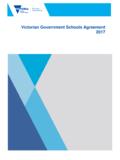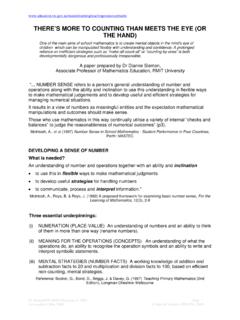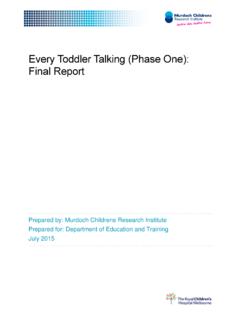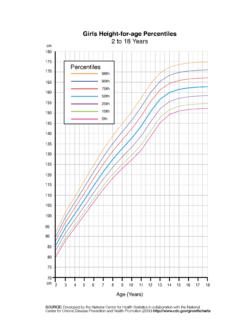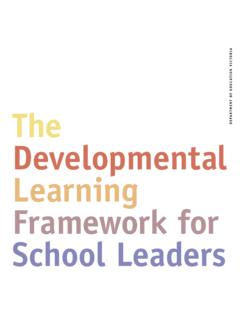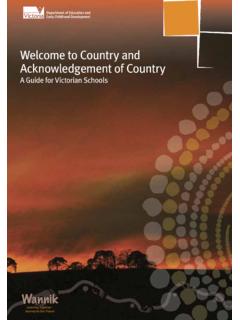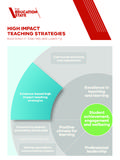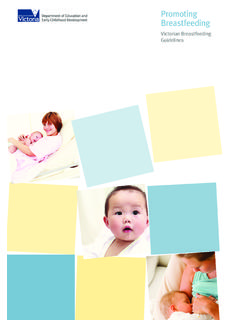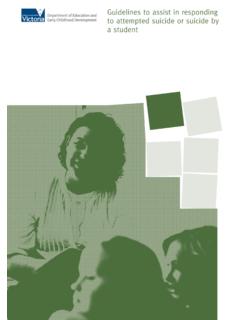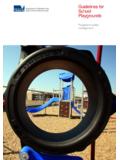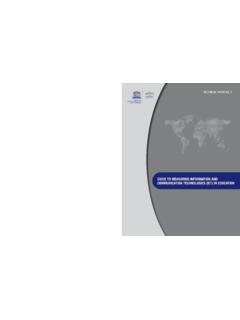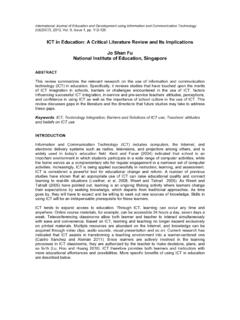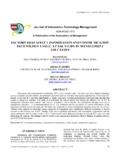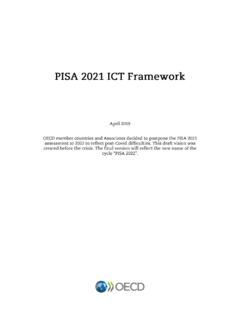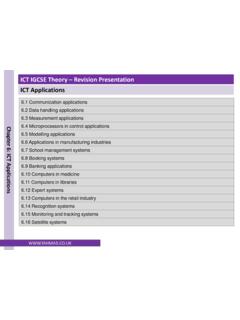Transcription of ICT Acceptable Use Policy - Department of Education and ...
1 Acceptable Use - Information and Communications Technology Resources Last updated 11 July 2018. CONTENTS. Overview .. 2. Scope .. 2. Definitions .. 3. 4. Breaches of this Policy .. 4. Use of Department ICT resources .. 6. Business Purposes .. 6. Personal Use .. 6. 6. Copyright Infringement .. 6. Illegal Use and Material .. 7. Offensive or Inappropriate Material .. 7. Malware .. 7. Social Engineering .. 7. Attribution .. 8. Mass Distribution and Spam .. 8. Confidentiality and 8. Department Property .. 8. Email Disclaimer .. 9. Access and Monitoring .. 9.
2 Records Management .. 9. Complaints .. 10. Speak-up' 10. Further Assistance .. 10. ICT Acceptable use Policy Page | 1. Overview This Guide outlines the Policy regarding the Acceptable use of the Information and Communications Technology (ICT) resources of the Department of Education and Training (the Department ). The Department is responsible for ensuring the use of Department ICT resources is legal, ethical and consistent with the aims, values and objectives of the Department and its responsibilities to employees, students and other ICT. users. All users of Department ICT resources are expected to exercise responsibility, use the resources ethically, respect the rights and privacy of others and operate within the laws of the State and Commonwealth, including anti- discrimination and sexual harassment laws and the rules and policies of the Department , including occupational health and safety obligations to employees and students.
3 Department ICT resources should not be used for inappropriate or improper activities. This includes: pornography, fraud, defamation, breach of copyright, unlawful discrimination or vilification, harassment, including sexual harassment, stalking, bullying, privacy violations and illegal activity, including illegal peer-to-peer file sharing. The audience of an electronic message may be unexpected and widespread and users should be mindful of this when using Department ICT resources. Department ICT resources are provided to improve and enhance learning and teaching, and for the conduct of the business and functions of the Department .
4 Using information technology, accessing information, and communicating electronically can be cost-effective, timely and efficient. Users are expected to use and manage these resources in an appropriate manner and in accordance with this Policy . As part of ensuring users are aware of this Policy , the following will occur: Users will be provided access to this Policy , on HRWeb Users will be reminded of the need for compliance with the Policy Users will be provided notification of updates or developments to the Policy . Scope This Policy applies to all users of Department ICT resources, as defined below, located at corporate offices and schools, and in private homes or at any other location.
5 This Policy applies to all use of Department ICT resources, including, but not limited to: Copying, saving or distributing files Data Downloading or accessing files from the internet or other electronic sources Electronic bulletins/notice boards Electronic discussion/news groups Email File sharing File storage File transfer Information Instant messaging Online discussion groups and chat' facilities Printing material Publishing and browsing on the internet Social networking Streaming media Subscriptions to list servers, mailing lists or other like services Video conferencing Viewing material electronically Weblogs ( blogs').
6 ICT Acceptable use Policy Page | 2. Definitions Authorised person For the purpose of this Policy , includes: The Secretary, a Deputy Secretary, an Assistant Deputy Secretary, a Regional Director, a regional Executive Director, a School Principal, the Executive Director People Division, the Chief Information Officer (CIO) or equivalent roles (or delegate). The Manager of the Employee Conduct Branch or the equivalent branch, or an officer of the Employee Conduct Branch authorised by the manager. Any other person authorised by the Secretary to the Department of Education and Training.
7 Department email eduMail and any other school or Department email system used for the purpose of school systems related or other Department electronic communications. Department email systems are part of Department ICT resources. Department ICT Includes but is not limited to all networks, systems, software and hardware including local resources area networks, wide area networks, wireless networks, intranets, Department email systems, computer systems, software, servers, desktop computers, printers, scanners, personal computers (desktops, notebooks and tablets), mobile phones, portable storage devices including digital cameras and USB memory sticks, hand held devices and other ICT storage devices.
8 Electronic Includes email, instant messaging, virtual conferencing, social media and any other communications material sent electronically. Malware Malicious software programs designed to cause damage and other unwanted actions on a computer system. Common examples include computer viruses, worms, spyware and trojans. Peer-to-peer file The sharing of files between systems on a peer-to-peer (P2P) network. Files can be shared sharing between computer systems on the network without the requirement of a central server. An example of illegal P2P file sharing is the sharing of copyrighted files without the authorisation of the copyright owner, such as copyrighted film, book and music files.
9 Personal use All non-work related use of Department ICT resources including internet usage, social networking and private emails. Phishing Phishing is the attempt to obtain sensitive information such as usernames, passwords, and credit card details (and, indirectly, money), often for malicious reasons, by disguising as a trustworthy entity in an electronic communication. Ransomware Ransomware is a type of malicious software that threatens to publish the victim's data or block access to it unless a ransom is paid. Spam Unsolicited commercial electronic messages sent over the internet.
10 User/s Any person using Department ICT resources. Vishing Vishing is a form of phishing that uses the phone system or voice over IP (VoIP). technologies. The user may receive an email, a phone message, or even a text encouraging them to call a phone number due to some discrepancy. If they call, an automated recording prompts them to provide detailed information to verify their account such as credit card number, expiration date, birthdate. Whaling Whaling is a type of phishing that targets high-profile users such as corporate executives, politicians and celebrities.
